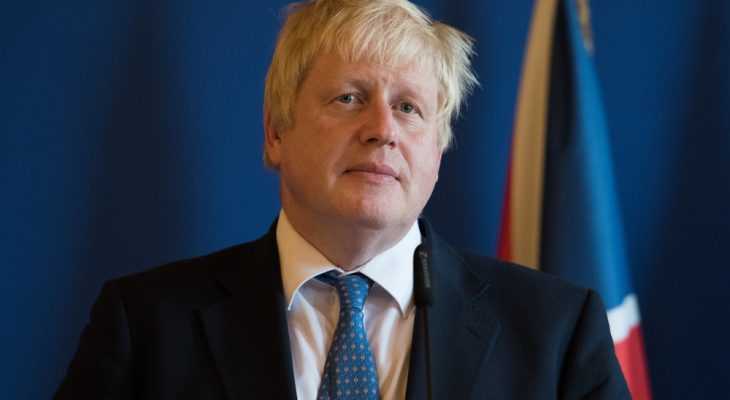UK election rivals face off for final time ahead of poll
Sat 07 Dec 2019, 16:16:50

London: The two men vying to be British prime minister in next week’s election exchanged trademark blows Friday over the familiar faultlines of Brexit and healthcare in the final head-to-head TV debate of the month-old campaign.
In a lacklustre hour-long battle largely devoid of standout moments, Prime Minister Boris Johnson repeatedly criticised Labour leader Jeremy Corbyn’s failure to say if he supports Britain leaving the EU while talking up his agenda.
“We have a fantastic plan to get Brexit done,” Johnson said, referring to a divorce deal he finalised with EU leaders in October.
“How can you get… a new deal from Brussels for Brexit, if you don’t actually believe in it?” he added, referring to Corbyn’s vow to remain neutral in a second EU referendum he wants to hold within six months.
The Labour leader is proposing to negotiate a softer form of Brexit to put up against remaining in the bloc in the vote.
He said Johnson’s vow to strike trade deals with both the European Union and the United States next year were unrealistic, and that Britain’s cherished national health service (NHS) was under threat.
“What he will do is walk out of a relationship with the EU into a relationship with nobody,” Corbyn said.
Corbyn has spent the campaign lagging in the polls and was in need of a breakthrough moment, but often found himself on the defensive on Brexit and other issues.
A snap poll by YouGov found the debate, the second head-to-head between the pair, was a draw, but that those questioned found Corbyn more trustworthy.
“Given the Conservatives went into this debate in the lead, they will hope the lack of a knockout blow means they can maintain this until voting day,” said Chris Curtis, YouGov’s Political Research Manager.
Johnson called the snap election — the third in Britain in nearly five years — last month to try to get a parliamentary majority which would enable him to secure backing for his divorce deal.
Voting takes place next Thursday. The Britain Elects poll aggregator puts the Conservatives on 42 percent, Labour on 33 percent and the Liberal Democrats on 13 percent.
The Greens and the arch-eurosceptic Brexit Party were both on three percent.
Ahead of Friday evening’s debate former prime ministers Tony Blair and John Major launched unprecedented interventions, calling for people to vote
tactically to help ensure a second referendum on Brexit.
tactically to help ensure a second referendum on Brexit.
Major, a Conservative who was in power from 1990 to 1997, and Labour’s Blair, who ousted him and was in Downing Street until 2007, addressed a rally for another poll in London Both want Britain to remain in the EU.
Major gave his backing to several candidates thrown out of the Conservative ranks for rebelling over Brexit.
“Let me make one thing crystal clear, none of them left the Conservative Party, the Conservative Party left them,” he said via video-link.
“Were I resident in their constituency I would vote for them.” Asked about the comments, Johnson insisted his party retained “a very broad spectrum of views” and noted that all Tory candidates had taken a vow to back his deal.
But in a blow to Johnson, a senior British diplomat in the US quit on Friday, criticising the government over Brexit.
Alexandra Hall Hall said she could no longer “peddle half-truths” on behalf of political leaders she did not “trust”, according to CNN, which obtained a copy of her resignation letter.
Earlier Friday, Johnson came under fire for avoiding a set-piece television interview that all other major party leaders have already subjected themselves to.
The prime minister has so far declined to undergo an uncomfortable grilling from Andrew Neil, who is one of the BBC’s top political interviewers, with less than a week to go until the election.
Former Sunday Times editor Andrew Neil said Johnson faced questions of trust, and it was his job to “scrutinise and hold to account those who would govern us”.
Corbyn meanwhile used Friday to unveil leaked documents he said proved Johnson was “deliberately misleading the people” about his Brexit deal.
He said the finance ministry papers suggested there would be customs declarations and security checks between mainland Britain and Northern Ireland, contrary to what he had said.
Corbyn returned to the subject during the debate, while reiterating his claims US President Donald Trump was eyeing the NHS for America’s pharmaceutical firms.
But Johnson strongly denied the claims.
“This is pure Bermuda Triangle stuff,” he said.
“We’ll be hearing about ‘little green men’ next.
“Under no circumstances will we sell it off to anybody in any kind of trade deal.”
No Comments For This Post, Be first to write a Comment.
Most viewed from International
Most viewed from World
AIMIM News
Latest Urdu News
Most Viewed
May 26, 2020
Do you think Canada-India relations will improve under New PM Mark Carney?
Latest Videos View All
Like Us
Home
About Us
Advertise With Us
All Polls
Epaper Archives
Privacy Policy
Contact Us
Download Etemaad App
© 2025 Etemaad Daily News, All Rights Reserved.

.jpg)
.jpg)
.jpg)






.jpg)


.jpg)
.jpg)
.jpg)
.jpg)
.jpg)
.jpg)
.jpg)
.jpg)
.jpg)
.jpg)
.jpg)
.jpg)

















